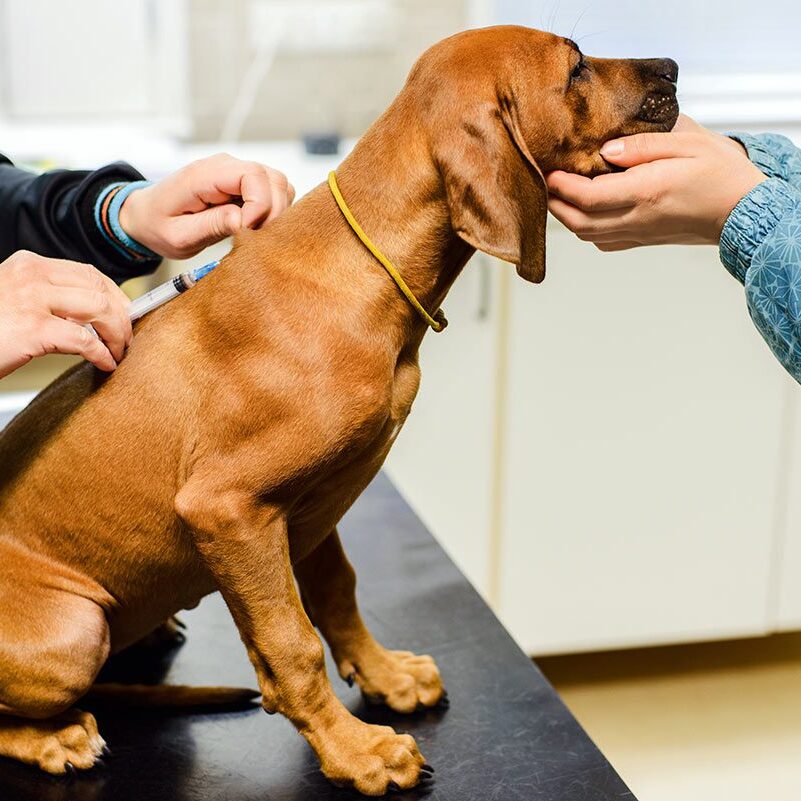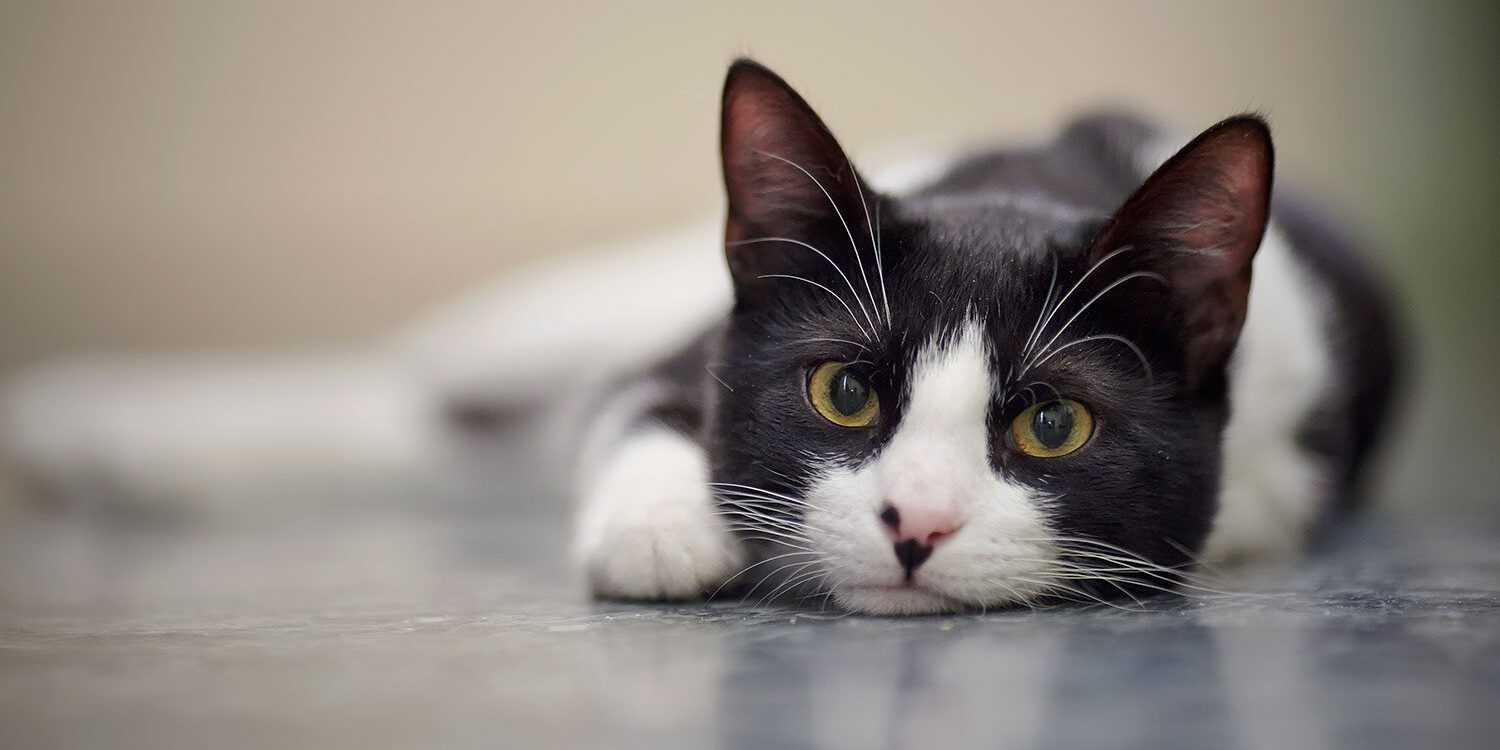
Cat & Dog Vaccinations in Dubuque, IA
Vaccinations are the closest thing to a protective “bubble” your pet has when it comes to keeping them safe from diseases in their environment. PetMed Animal Health Center offers a broad range of cat and dog vaccines to meet each pet’s every need, so you can expect a custom vaccination schedule that’s best for your unique pet. Here in Dubuque, IA, we see all manner of viruses and infections. Fortunately, despite the ever-present nature of these conditions, it’s never been easier to give your dog or cat optimal protection for a healthier life.
Update your pet’s vaccinations today. Call us at (563) 583-8387 or request an appointment online!
How Dogs & Cats Benefit from Vaccinations
Vaccinations give your pet’s immune system a boost against different diseases so it can fight off any pathogens it encounters. The goal of vaccinating your pet is to prevent serious illness and prevent the spread of disease among dogs and cats as much as possible. And since some animal diseases can be transmitted and spread among humans, vaccinating your pets has the added benefit of keeping you and your other human family members safer and healthier, too.

Our Recommended Vaccination Schedule for Puppies
It’s important to begin your pet’s vaccinations when they’re young, but this can vary depending on when you adopt your pet. Know that not all vaccines are going to be needed for all puppies/dogs. We’ll help you decide which vaccines are best for your puppy based on their exposure level and lifestyle.
Rabies is a fatal disease in virtually every case of infection, so vaccination is required by Iowa state law.
- The first vaccine should be given between 12-16 weeks of age
- The booster should be given 1 year after the first vaccine, and every 3 years after that.
- Note: Iowa law requires that any patient overdue on their rabies vaccine, even by 1 day, be revaccinated with a 1-year booster.
DAPP is a core vaccine that your puppy should get before coming into contact with other puppies and dogs.
- The first vaccine should be given starting around 6 weeks of age, continuing with a booster every 3 weeks up to 16 weeks old.
- The next DAPP booster should be given 1 year after the initial vaccine series, and then every 3 years after that.
The kennel cough vaccine is needed for any pet going to daycare, grooming, boarding, and dog parks. This is because kennel cough frequently spreads (and quickly) among dogs in close proximity.
- Your pet’s first kennel cough vaccine should be given as early as 6 weeks of age.
- After the first vaccine, your pet should be boosted for kennel cough yearly (high-risk pets may need to be boosted every 6-9 months).
Leptospirosis is a bacterial disease shed by wildlife and farm animals. The bacteria, Leptospira, can be found in many water sources, and even puddles.
- The leptospirosis vaccine should be given as early as 8 weeks of age. A booster should be given 3-4 weeks later.
- After that, your pet should be boosted once a year to maintain their protection.
Lyme disease is transmitted by ticks. Ticks are everywhere, and Lyme disease is particularly active in our area.
- Your pet’s first Lyme booster should be given as early as 8 weeks of age. They should receive a second booster within 3-4 weeks.
- After the initial boosters, your pet should be boosted once a year to keep up their protection.
Rabies
Rabies is a fatal disease in virtually every case of infection, so vaccination is required by Iowa state law.
- The first vaccine should be given between 12-16 weeks of age
- The booster should be given 1 year after the first vaccine, and every 3 years after that.
- Note: Iowa law requires that any patient overdue on their rabies vaccine, even by 1 day, be revaccinated with a 1-year booster.
DAPP (Distemper, Adenovirus 1 and 2, Parainfluenza, Parvovirus)
DAPP is a core vaccine that your puppy should get before coming into contact with other puppies and dogs.
- The first vaccine should be given starting around 6 weeks of age, continuing with a booster every 3 weeks up to 16 weeks old.
- The next DAPP booster should be given 1 year after the initial vaccine series, and then every 3 years after that.
Kennel Cough (Bordetella)
The kennel cough vaccine is needed for any pet going to daycare, grooming, boarding, and dog parks. This is because kennel cough frequently spreads (and quickly) among dogs in close proximity.
- Your pet’s first kennel cough vaccine should be given as early as 6 weeks of age.
- After the first vaccine, your pet should be boosted for kennel cough yearly (high-risk pets may need to be boosted every 6-9 months).
Leptospirosis
Leptospirosis is a bacterial disease shed by wildlife and farm animals. The bacteria, Leptospira, can be found in many water sources, and even puddles.
- The leptospirosis vaccine should be given as early as 8 weeks of age. A booster should be given 3-4 weeks later.
- After that, your pet should be boosted once a year to maintain their protection.
Lyme Disease
Lyme disease is transmitted by ticks. Ticks are everywhere, and Lyme disease is particularly active in our area.
- Your pet’s first Lyme booster should be given as early as 8 weeks of age. They should receive a second booster within 3-4 weeks.
- After the initial boosters, your pet should be boosted once a year to keep up their protection.
Our Recommended Vaccination Schedule for Kittens
Kittens also need to begin their vaccinations early so they can start building up their immune systems and grow into healthy adult cats. Cats have fewer recommended vaccines than dogs, but they benefit just as much from the protection these vaccines offer.
Similar to dogs, rabies is also fatal in cats and required by Iowa state law.
- Your kitten’s first rabies vaccine should be given at 12-16 weeks of age.
- The rabies booster should be given one year after the initial vaccine, and then every year thereafter.
FVRCP is a core vaccine for cats, sometimes called “feline distemper.”
- The first FVRCP booster is given as early as 6 weeks of age, and given every 3 weeks until your kitten is 16 weeks old.
- After the initial series, your cat should get their next booster a year later, then every 3 years after that.
Feline leukemia is a life-threatening contagious disease. All kittens should be vaccinated for this disease, and if they remain at risk into adulthood, they should continue to receive a booster each year. Your veterinarian can help you decide on the best option for your cat.
- Your kitten’s initial FeLV booster should be given at 8 weeks old, with the second given within 3-4 weeks.
- If your cat remains at risk for feline leukemia as an adult, they should get their FeLV booster once a year.
FIV is a contagious virus among cats/kittens and is sometimes referred to as Feline AIDs. While there is a vaccine available, we do not recommend it unless your pet’s exposure is extremely high.
Rabies
Similar to dogs, rabies is also fatal in cats and required by Iowa state law.
- Your kitten’s first rabies vaccine should be given at 12-16 weeks of age.
- The rabies booster should be given one year after the initial vaccine, and then every year thereafter.
FVRCP (Rhinotracheitis, Calicivirus, and Panleukopenia)
FVRCP is a core vaccine for cats, sometimes called “feline distemper.”
- The first FVRCP booster is given as early as 6 weeks of age, and given every 3 weeks until your kitten is 16 weeks old.
- After the initial series, your cat should get their next booster a year later, then every 3 years after that.
Feline Leukemia (FeLV)
Feline leukemia is a life-threatening contagious disease. All kittens should be vaccinated for this disease, and if they remain at risk into adulthood, they should continue to receive a booster each year. Your veterinarian can help you decide on the best option for your cat.
- Your kitten’s initial FeLV booster should be given at 8 weeks old, with the second given within 3-4 weeks.
- If your cat remains at risk for feline leukemia as an adult, they should get their FeLV booster once a year.
Feline Immunodeficiency Virus (FIV)
FIV is a contagious virus among cats/kittens and is sometimes referred to as Feline AIDs. While there is a vaccine available, we do not recommend it unless your pet’s exposure is extremely high.
